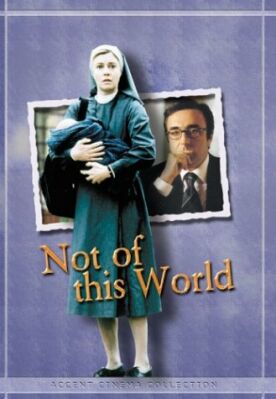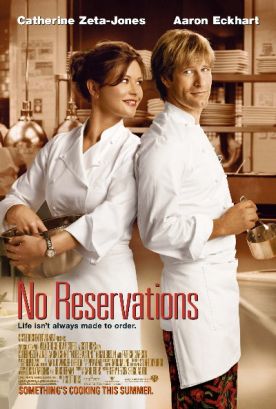Not Of This World (Fuori dal Mondo)
Not of this World by Giuseppe Piccioni is, like Erick Zonca’s The Dreamlife of Angels, a life-changing movie, a movie that I would have thought it impossible to watch unmoved, impossible to forget once seen, but for the fact that the New York Times‘s critic called it a “loamy soap opera” and “a melodrama of modest ambitions.” Where do they find these people? The film is neither soap opera nor melodrama, though it may be that these terms have now entered the critical vocabulary without any substantive meaning attached to them at all, but just as a way of saying you don’t like something. In this sense, I suppose they imply some excess of feeling or fake emotion, but that is even more spectacularly wrong when applied to this film, one of whose chief virtues is its emotional understatement.
It tells the story of a nun, Sister Caterina (Margherita Buy), on the point of taking her final vows, who is presented with a foundling child by a jogger. Sister Caterina makes some effort to identify the mother by the sweater the baby is wrapped in, and this clue leads her to Ernesto Nitti (Silvio Orlando), the lonely and emotionally bottled-up proprietor of a dry-cleaning establishment in Milan. Both the nun and the dry-cleaner are drawn into a complex emotional attachment to the child—and to each other—which threatens to explode the carefully-constructed lives they have built for themselves.
In a Hollywood movie, they would naturally set up housekeeping together and adopt the child, but Hollywood would consider the sister’s religious vocation no obstacle at all. Here it is central to the film’s meaning, not only because Sister Caterina is wavering between the cloister and the world, and the baby comes to represent for her all that she is giving up, but also because Ernesto, an atheist, is fascinated by it. “Is it true you get a call?” he asks her shyly. Hard as her choice seems to her, he envies her having it at all. “Sometimes you can’t choose,” he says. More generally, he wonders what it means to believe. “Say God exists,” he says. “Why all this bowing and praying? Why all this exaggerated love?”
“Because love is exaggerated,” answers Sister Caterina. “Have you ever loved someone without exaggeration?” Ernesto has nothing to say to this. We can actually see him wondering if he has ever loved anyone at all.
The mother of the child is one of his former employees, Teresa (Carolina Freschi), a pretty young woman who is now back together with the boyfriend with whom she conceived it, having abandoned it during their separation. The boyfriend doesn’t know of the child. It emerges, however, that Ernesto himself slept with the girl during this period and begins to believe that the child may be his. To him as to Sister Caterina, the baby, now put up for adoption by the authorities, comes to represent all that life has not given them, even though neither is entirely sure that it would have been wanted. In the Sister’s case, her regret for the lost chance of motherhood is complicated by the fact that her own mother (Giuliana Lojodice) bitterly opposes her choice of the religious life.
“Don’t throw your life away like this,” says mother.
“It’s the life I’ve chosen,” says Sister Caterina. “I’ve given my life to God.”
“There’s always someone more important than your mother.”
It’s a funny line because it is selfish and manipulative, but it also sums up her daughter’s pain, invisible to her, caused by devotion to Someone more important than motherhood.
For the dry-cleaner’s part, the unexpected tug of human love at the hem of his garment makes him realize how isolated he has made himself. Sister Caterina gets to know his employees better in five minutes than he has ever done. She reports back to him in a matter-of-fact, uncensorious way: “The girls say you don’t remember their names and if you invited them out for dinner they wouldn’t go. They say you’re always sad. . . But they did say you’re fair at work and when times were hard you didn’t lay any of them off. So there is some good in you.”
“That’s a relief,” he says, sadly.
When Ernesto is suddenly taken ill and taken to the hospital, Sister Caterina comes to visit him there. “Why did you come to the hospital?” he asks her.
“You needed help,” she replies.
“Would it have been the same if it had been someone else?”
“Of course,” she says. At one level this is both a commentary on his unlovability and on the Sister’s determination to stick to the ideal of a pure, disinterested love for all people, but at another level we know already that neither of these things is true. When the climactic confrontation with Teresa takes place—ironically at a wedding—and Sister Caterina reports back to Ernesto that he is not the father, she says to him with almost heart-breaking sadness “You have nothing to do with it. Neither of us have.” And they embrace like two abandoned children themselves.
Yet the ending is unexpectedly upbeat. It has not all been for nothing, and maybe even the remote God who doesn’t listen anymore (“God doesn’t have to listen to us,” says the Sister didactically; “we have to listen to God”) is not so remote after all. What else does it mean to answer up, like the novices whose induction we witness here, “Did You call? I’m here”?
I can’t say enough good about this wonderful movie, and should also mention here the beautiful and evocative score by Ludovico Einaudi. If you come away from it unmoved, I’ll personally refund the price of admission. But if you come away from it thinking it a soap opera or a melodrama, there’s a future for you at the New York Times, and you don’t need the money.
Discover more from James Bowman
Subscribe to get the latest posts to your email.








